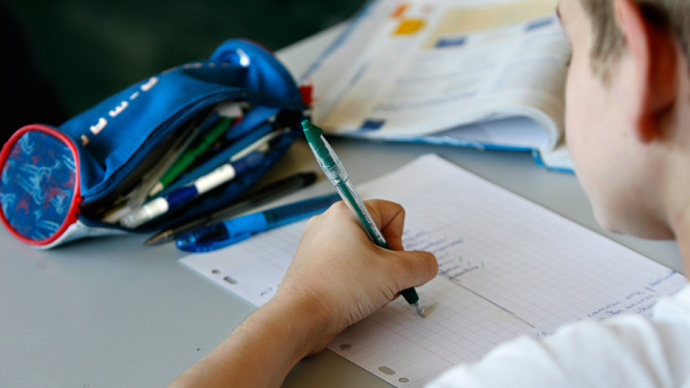‘Genetically screen 4 y/os to detect early learning deficiencies,’ says scientist

Testing young children’s genetics would help detect early learning deficiencies and open the door to specially-tailored intervention, a scientist has claimed.
Professor of Behavioral Genetics at King's College London Robert Plomin said genetic screenings for children aged four and upwards could assist the early development of youngsters.
Plomin made the remarks in advance of his latest report’s release, which claims that a child’s performance in subjects such as art and science is down to its genetic makeup.
Professor Plomin will publish his research later this week. As part of his research, he studied more than 10,000 sets of twins – a mixture of identical and non-identical pairs.
READ MORE: Chimps communicate by smiling like humans, share common ancestor
READ MORE: In the genes? Sex criminals’ relatives 5 times more likely to also offend – researchers
READ MORE: New research reveals why animals don’t get schizophrenia and humans do
His findings suggest a child’s performance at school relates directly to its genetic makeup. They also suggest identical twins are more likely to have similar grades in science or arts-based subjects than their non-identical counterparts.
Speaking to the Daily Telegraph, Plomin said the field of genetics is a useful lens for understanding education.
“There is a genetic way of thinking about education and it begins by recognizing and respecting individual differences,” he said.
“When children don’t do well at school, you can’t just blame the parents, the school, or the kids themselves.”
Plomin acknowledged a proportion of the public would “freak out” at the prospect of making definitive predictions based on genetics. But he insisted screening children in this fashion is a useful means of detecting early learning deficiencies so they can be assisted throughout their education.
Plomin said that genetics screening techniques are soon to become a reality.
“With some of these techniques you can begin to identify the genes that are involved,” he said.
“Eventually it will become possible to predict which kids are going to find it more difficult to learn.”
Plomin said language interventions could take place at age three or four. He insisted this age is characterized by a sharp advance in linguistic development and so “is a good time to start.”
The Professor of Behavioral Genetics also argued that spotting possible learning problems earlier is key to tackling low self-esteem in youngst
“Once humpty dumpty falls off the wall it is hard to put him back together again. So when kids fail at reading, their self-esteem goes down, a lot of other things go to pot,” he said.
The concept that genetics are hardwired and predetermine a child’s capacity to master certain school subjects of life skills has long been a subject of debate.
In July 2014, researchers from the University of Oxford, University College London (UCL) and King’s College London produced a report which argued pupils’ grasp of differing academic disciplines was likely to be as heavily influenced by upbringing and environment as genetics.
The researchers also found that “life experience” was an important determining factor in educational success.












